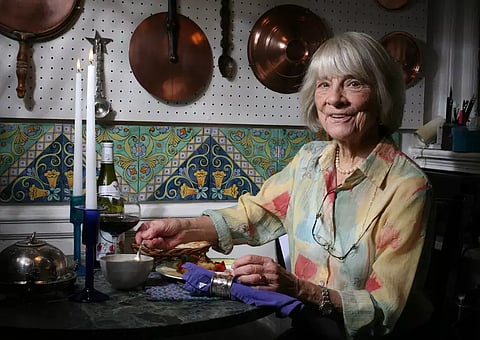

People outside the publishing industry often wonder what it is, exactly, that editors do. “Most of them do nothing,” one of the most storied, Robert Gottlieb, told the author Sara B. Franklin. Nothing is as bad as too much, and yet I’ve long thought the profession — not for nothing does it include “book doctors” — should have its own version of the Hippocratic oath.
Judith Jones, the subject of Franklin’s essential if adulatory new biography, “The Editor,” was the rare text surgeon who also had an excellent bedside manner. Jones, who died in 2017 — six years before
Gottlieb, who came in over her head to run Knopf — was widely memorialized as a culinary editor, and rightly so. A passionate home cook, she introduced Julia Child to America and published books on a wide range of cuisines by Edna Lewis, Madhur Jaffrey, Claudia Roden and many others. She fended off Big Agriculture with small, local asparagus spears and reawakened a national palate lulled by midcentury convenience foods.
But as “The Editor” makes painfully apparent, Jones’s contribution to the history of regular old literature has often been minimized or outright erased. A certain recessiveness is part of the job, of course, and yet mention of her name can draw blank stares even among the best-connected in “the biz.”
We owe to her nothing less than “The Diary of Anne Frank” reaching these shores and, after she met him in a hallway, almost the entirety of John Updike’s oeuvre. Ditto Anne Tyler’s. Jones was also a gravitational force, for better and worse, in Sylvia Plath’s brilliant and shortened arc. Working with dozens of other authors, helpfully listed in a coda, she burnished and sustained Knopf’s reputation as the most prestigious publishing house in the country while also earning it piles of money.
Franklin, who has a Ph.D. in food studies, met Jones for an oral-history project toward the end of her life, when “she wore her age like a fact,” as she nicely writes. Cooking and confiding, they became friends. At the funeral, a family member pulled her aside and offered turnkey access to two rooms filled with personal papers. It isn’t so often you flip to the acknowledgments page of a biography and read valedictory lines to the subject like “I loved you so much; I love you still.” But perhaps this is in keeping with Jones’s own defiance of patriarchal convention.
She was born Judith Fifield Bailey, the younger of two daughters, and raised Christian — we’re not told what denomination — with extended family in a solid but second-tier building on the Upper East Side of Manhattan. Prone to invalidism, she read a lot. Her father was a lawyer from Vermont, where they spent summers, and her mother a chilly social climber; for college, Judith chose not a Seven Sister but Bennington, where, as a founder said, “a girl could hang upside down in her bloomers if she felt like it.” Her first big affair was with one of her teachers, the poet Theodore Roethke, who urged his students to “listen, listen, listen.” Later on, as a junior staffer at Doubleday, she would edit him.
With a letter of introduction from the Hungarian-born intellectual Arthur Koestler, young Judith traveled to postwar Paris, where authors were thicker than pigeons on the sidewalk. There she also discovered the market and kitchen, horrifying her mother, who considered such pursuits low-class. Working for a shortlived glossy called Weekend, she fell in love with the editor Richard Evan Jones, a married father of two with whom she’d eventually elope to Vienna and enjoy a long, loving and professionally fruitful union. (I highly recommend their 1982 gluten salute, “The Book of Bread.”)
Afflicted with painful endometriosis, which doctors infuriatingly used to call “the career women’s disease” — Franklin recounts Jones bleeding profusely in her assistant’s cubicle, then going back to her desk — she was unable to conceive children, which she wanted badly. But the couple adopted two of a relative’s teenagers, including them in adventuresome dinners. “That was mean of me,” she admitted, of serving tripe.
Franklin revels in all the food stuff, but does not skimp on general publishing history, like Jones’s apprenticeship to the colorful Blanche Knopf. (We’ll need more time to contextualize recent upheaval at the house.) Plath’s suicide came distressingly soon after Jones, who’d published her “The Colossus and Other Poems” in the States, had rejected her novel, “The Bell Jar.”
Lionized in recent years, especially after release of the documentary “Turn Every Page,” Gottlieb comes off here as dismissive of Jones’s talents. He called her a “lady” with a “rich husband,” suggested her authors didn’t need much input, and was defensive about underpaying her. She was not a “marcher,” as a colleague put it, but firmly feminist in her achievements, and remarkably tenacious in mind and body, surviving a flash flood with dog in arms months after her widowhood.
I don’t mind that “The Editor” is a valentine. But surprisingly, given the richness of the material, I closed it feeling slightly underfed, wanting more butter between the slices of this big life. We learn about Tyler’s development as an author, for example, but there’s nothing about her ’80s blockbuster, “The Accidental Tourist.” Jacqueline Susann would probably dispute that Child’s then-publicist invented the modern book tour. Jones’s failure to see the talent of Alice Munro — twice — is alluded to in the introduction, but never explained.
And the editor herself would probably have excised a few of her biographer’s clichés, the striking of gold and going over the moon and firing on all cylinders. But with the utmost tact, bien sûr.
Alexandra Jacobs is a Times book critic